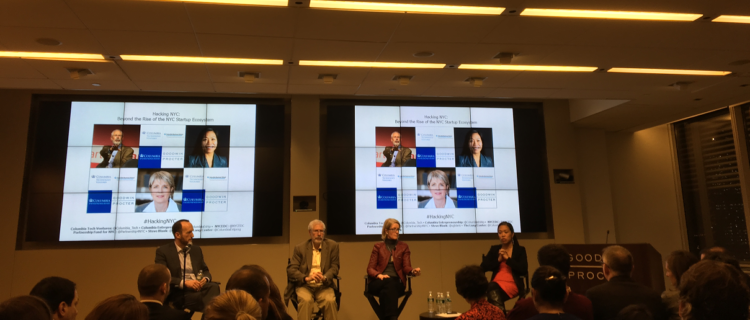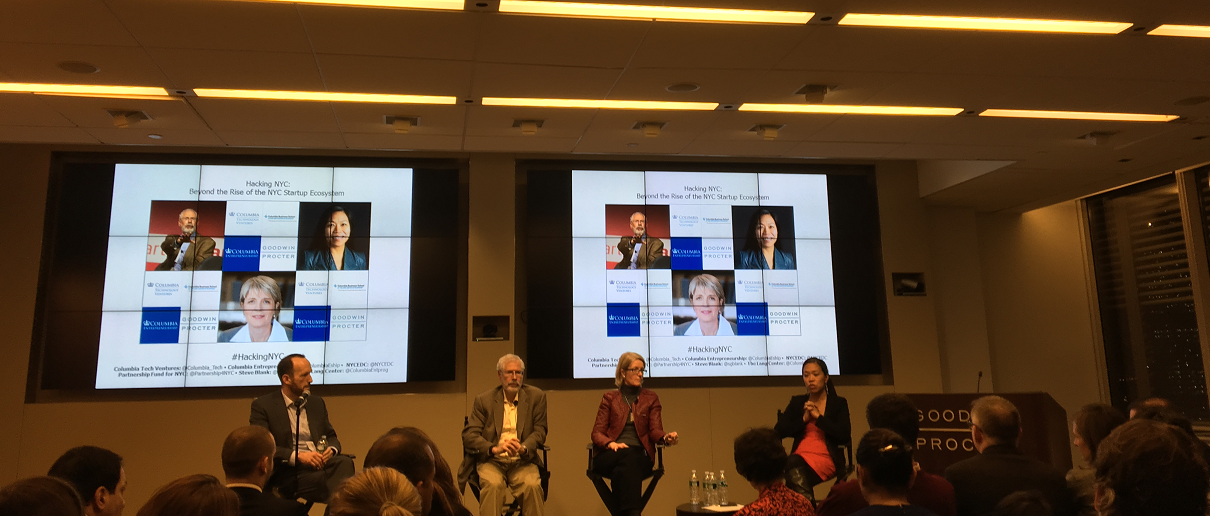How did the New York startup scene reach its booming status today? Accident or engineered? Government or Private sector help? New York has finally reached a competitive level in the eyes of the tech sector. It’s now okay to fail here and that’s a good thing.
The Hacking NYC panel discussion put together an impressive cast of influencers. With Steve Blank, serial entrepreneur bringing perspective from the Silicon Valley environment; Maria Gotsch President and CEO at the Partnership Fund for New York City; Maria Torres-Springer leading public sector NYC economic growth at the New York City Economic Development Corporation (NYCEDC); and Orin Herskowitz, the moderator, hailing from the Columbia Tech transfer office, the debate ensued.
Steve Blank argued that the NYC startup scene has been ‘consciously engineered’ as a way of making the city’s economy more diverse and not as dependent upon Wall Street. Silicon Valley was more serendipitous, generating from government funding of weapons and defense research spending during the Cold War, he said.
Innovation often springs out of crisis situations according to Blank. The rest of the panel referenced the dot com bubble recovery, and a need to diversify away from Wall Street after the Lehman Brothers collapse in 2008. The NYCEDC was engineered in response to these crisis events. New York showed impressive resilience pushing forward to reinvent itself inherently leading to NYC startup scene growth.
Over the past 15 years, NYC has put up impressive numbers (measured in startups formed, fundraising volume, and revenue generated) compared to the innovation hubs of SF/Silicon Valley and Boston. NYC has seen a boom of tech innovation taken hold, with companies like Tumblr, and Etsy headquartered here and Google and Twitter planting flagship offices spanning entire city blocks. In 2015, NYC based startups saw a combined $6.66 billion in venture funding while San Francisco/Silicon Valley’s $33.2 billion in financing activity still led the pack, according to CB Insights.
Sponsored by Eugene Lang Entrepreneurship Center, Columbia Technology Ventures and Columbia Entrepreneurship, the panel acknowledged the role higher education and the city’s youthful and well educated workforce played in the growth as well. With the Columbia Tech transfer office boasting about the 27 patent backed startups that came out of Columbia University last year.
Culture influences the growth of any city’s economy. New York City, where entrepreneurs seek out the American Dream, didn’t always seem achievable. The ‘risk culture’ of New York City has seen a vast improvement over the last 15 years according to Maria Gotsch and Maria Torres-Springer, but still has room for growth. In California, risk acceptance was inherent in the making of the innovation scene. Both Maria’s agreed that there was a shift in the acceptance of being a failed entrepreneur in New York City. Instead of ridiculing founders for their failed startup, founders were deemed ‘experienced’ and asked about when they would start their next endeavor.
The Bloomberg administration was credited with much of the culture shift in New York City. With government programs adopting technology (albeit slowly), the industry became an accepted profession. Mayor de Blasio is striving to continue supporting the tech sector with the appointment of Minerva Tantoco as the City’s first ever Chief Technology Officer (CTO) and the launch of Digital.nyc, a resource for all things digital.
Without ‘risk capital’, developing startups are like ‘clapping with one hand. They don’t make much noise,’ according to Blank. It’s vastly easier to start a company now than ever before. With the rise of cloud computing (not the only factor), the cost of starting a software startup has never been so inexpensive. In the days of Steve Blank, it used to cost $4 million just to buy the hardware to start developing. Now, that cost has dropped 1000x, he said.
New York City is booming at the moment with subway ridership at all all time high and fierce competition for housing in key neighborhoods. Anyone who wants a tech job seemingly can find one with the proper motivation and skills. But will it last? NYC is betting it will by investing in a few strategic initiatives going forward. The tech sector is helping to diversity the city’s economy. New York is growing at a steady pace, but it still has a long way to go to compete with Silicon Valley.




